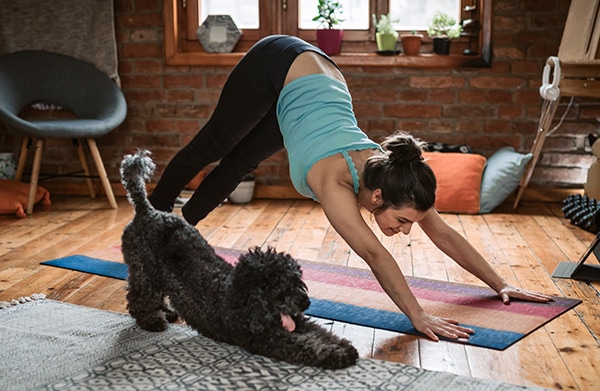You may be wondering how you are going to be able to exercise your dog if you are unable to leave your home. There are many ways that you can keep your pet active whilst at home and keeping them mentally exercised will help to balance this.
 There’s no substitute for getting out in the fresh air and walking your dog. Whether you take your dog out around your neighbourhood, walk them to the nearest park, or find a totally new place to explore on foot – walking them everyday will provide them with an all-round workout.
There’s no substitute for getting out in the fresh air and walking your dog. Whether you take your dog out around your neighbourhood, walk them to the nearest park, or find a totally new place to explore on foot – walking them everyday will provide them with an all-round workout.
However, there will be times when you just can’t get out. With ongoing uncertainty around COVID-19 (Coronavirus), and with many of us unable to leave our home, knowing how to keep your dog fit at home could really help keep them healthy and happy. Keeping your dog in the house or garden for a long period of time, without being able to explore new places, interact with other animals or put their senses to good use, will impact both their physical health and mental wellbeing.
As with any exercise, the amount and type of activity will vary according to the age, breed and general health of your pet. If you’re unsure, please contact your vet.
Here are a range of ideas for how you can maintain their fitness at home:
- Focus on agility by creating your own obstacle course:
This clearly depends on the space you have available, however creating something for your dog to jump over, run through or skip around is a fun way to introduce exercise at home – either indoors or in the garden. You don’t have to have professional equipment, using soft items such as cushions can provide them with a low-risk obstacle. - Play hide and seek:
Tell your dog to stay in a room, go and hide and then call them. They’ll use a range of their senses trying to find you – plus providing additional joy when they do. Just don’t get overly excited and give away your hiding place too soon… - Playing games to earn rewards:
By hiding their treats around the house, you can make them earn their reward – not only allowing them to exercise but keeping them mentally active in the process. There are also a range of interactive toys available which will stimulate both their mind and body. - Try and teach your dog something new:
If you never have the time to try and teach your dog a new trick or an activity – now might be the ideal time. Just remember to not overly-reward the activity, otherwise you’ll defeat the object. You could use a proportion of their daily food allowance for treats. - Get some new toys:
There’s lots of research that suggests that dogs love new toys. If they’re bored with the old ones, why not put them away and give them something new to play with. By rotating which toys they have available – it will maintain their interest and keep them active. - Play fetch:
Do you have the space to play fetch with your dog? If you can find a space to throw a ball or toy, your dog will love to return it… or maybe now is the time to try and train them to return it? Maybe down your hallway or from inside the house to out?
Rewarding behaviour is a good way of encouraging your dog to participate in activities. However, overfeeding your pet could result in obesity – which can result in greater stress on bones, heart, lungs and other organs. With a period of isolation now ongoing, controlling your dog’s calorie intake may become even more important. Reducing after-dinner scraps and reducing treats in-between mealtimes will help. You can find out more by reviewing our guidance on obesity in dogs.
If you have any concerns about your pet’s health, please give us a call on 01592 599 500. Please ensure you call us or read our latest guidelines in case of an emergency.





